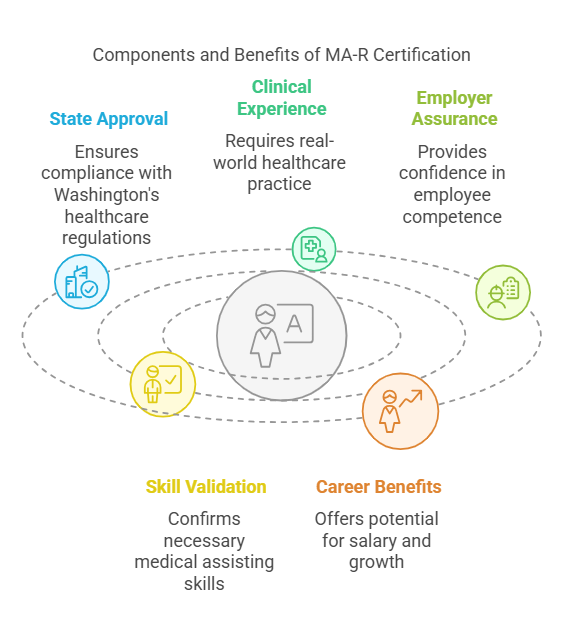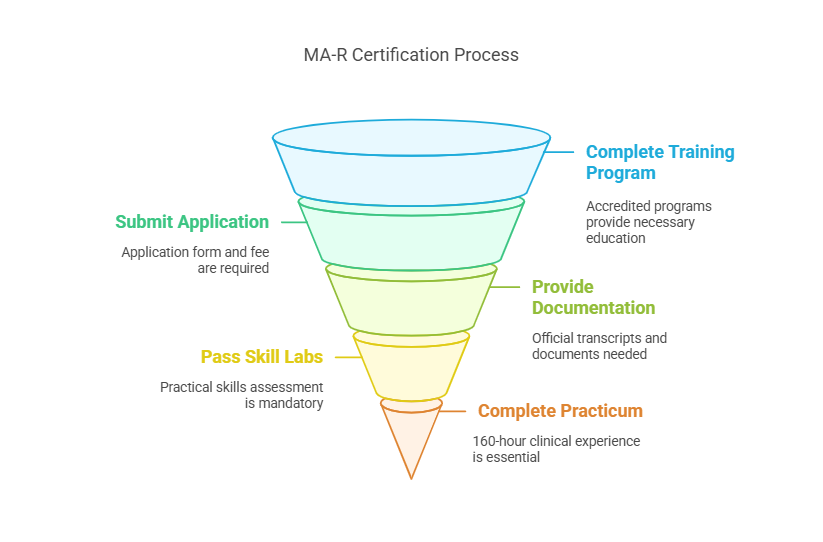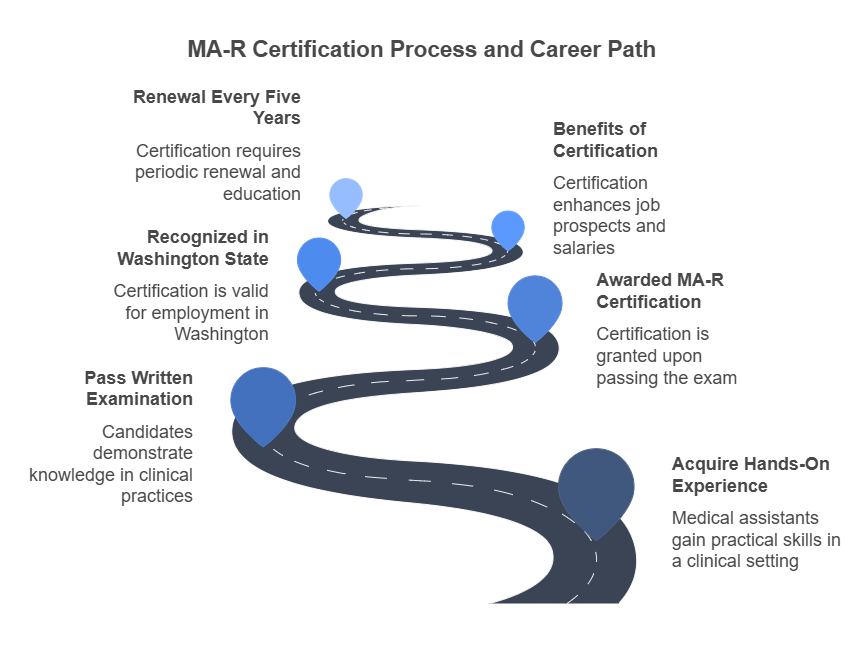Understanding MA-R Certification: Requirements and Benefits Explained
MA-R (Medical Assistant-Registered) certification is a credential for medical assistants who have completed a training program and gained hands-on experience in the field. This certification is specific to the state of Washington and is offered by the Washington State Department of Health. It signifies a medical assistant’s competence in both clinical and administrative tasks, ensuring they meet state healthcare standards. Achieving MA-R certification is a crucial step for those aiming to advance their careers and improve job prospects in the healthcare industry.

Overview of MA-R Certification
The MA-R certification recognizes medical assistants who have undergone a state-approved training program and obtained real-world clinical experience. Unlike other national certifications, MA-R is specific to Washington state and is designed to meet the state’s healthcare regulations. This certification reassures employers that medical assistants have the necessary skills to handle patient care, administrative duties, and clinical procedures.
Certification, such as medical billing and coding certification offered by AMBCI, plays a crucial role in the medical assisting profession. It demonstrates that an individual has met rigorous state standards and possesses the expertise needed for the job. Employers often prefer hiring certified medical assistants, as it guarantees a level of competence and professionalism. Furthermore, certification can significantly enhance salary potential and career growth opportunities.

Eligibility and Application Process
To be eligible for MA-R certification, applicants must complete a medical assistant training program accredited by the Accrediting Bureau of Health Education Schools (ABHES) or the Commission on Accreditation of Allied Health Education Programs (CAAHEP). They must also hold a high school diploma or equivalent and be at least 18 years old.
The application process involves submitting an application form, paying a fee, and providing official transcripts and other documentation. Candidates must successfully complete required coursework, pass skill labs, and complete a 160-hour practicum in a clinical setting. These steps ensure that medical assistants gain both theoretical knowledge and practical experience before certification.

Work Experience and Certification Process
Medical assistants seeking MA-R certification must acquire hands-on experience through a supervised clinical setting. This practical experience allows them to develop essential skills in patient interaction, medical procedures, and administrative tasks. Candidates must then pass a written examination that evaluates their knowledge of clinical practices, healthcare regulations, and administrative responsibilities.
Once they pass the exam, they are awarded MA-R certification. This credential is recognized throughout Washington state and enables medical assistants to work in hospitals, clinics, and private practices. However, individuals moving to other states may need to obtain additional certification, such as the Certified Medical Assistant (CMA) or Registered Medical Assistant (RMA) credential, which have nationwide recognition.
Benefits of MA-R Certification
Obtaining an MA-R certification provides numerous career benefits. It enhances job prospects by making candidates more competitive in the healthcare field. Certified medical assistants often receive higher salaries than their non-certified counterparts and are more likely to secure stable employment.
The certification also demonstrates a commitment to the profession, increasing trust among patients and employers. Since the certification ensures competence in both clinical and administrative duties, it broadens career opportunities across different healthcare settings. Additionally, certified medical assistants can pursue further education and specialization, leading to leadership roles or higher-paying positions in the healthcare industry.
Continuing Education and Renewal
MA-R certification requires renewal every five years to ensure medical assistants remain up-to-date with industry advancements. To renew the certification, medical assistants must complete continuing education courses and pay a renewal fee. These courses can be completed online or in-person, offering flexibility for professionals working in the field.
Keeping up with continuing education is crucial as it allows medical assistants to stay informed about new medical technologies, updated healthcare policies, and best practices in patient care. Some states may also require additional training in areas such as infection control or emergency procedures as part of the renewal process.
Career Opportunities and Growth
MA-R certification opens doors to diverse career opportunities. Certified medical assistants can work in hospitals, physician’s offices, outpatient care centers, and specialty clinics. With experience, they can advance into supervisory roles, medical office management, or even pursue specialized certifications in areas such as phlebotomy, EKG technology, or medical billing and coding.
For those looking to grow their careers, further education can lead to higher positions such as healthcare administrator, nursing assistant, or even a registered nurse (RN) with additional schooling. The demand for medical assistants continues to rise in 2025, with job growth projected to be much faster than average due to the increasing need for healthcare services.

6 Lesser-Known Facts About MA-R Certification
MA-R Certification is State-Specific: The Washington State Department of Health outlines the requirements for medical assistant certifications, indicating that certain credentials, such as the MA-R, are specific to Washington state.
doh.wa.govNo National Exam Required: Unlike some certifications, the MA-R credential does not require a nationally recognized exam. This makes it a more accessible option for Washington-based medical assistants.
doh.wa.govAllows Work in Multiple Settings: MA-R certified professionals in Washington state are authorized to work in various healthcare settings, including hospitals, outpatient facilities, urgent care centers, and assisted living facilities, depending on employer requirements.
doh.wa.govCan Lead to Further Specializations: Obtaining an MA-R certification can serve as a foundation for pursuing specialized medical careers, such as surgical technologist, phlebotomist, or medical office administrator.
en.wikipedia.org
preppy.orgNot All Employers Require Certification: While certification enhances job prospects, some employers in Washington may hire medical assistants without the MA-R certification, provided they meet state training requirements.
doh.wa.govShorter Training Programs Available: Some MA-R programs can be completed in as little as six months, offering a quick pathway into the healthcare workforce.
doh.wa.gov
Frequently Asked Questions (FAQs)
-
Most MA-R certification programs take 6 months to 2 years, depending on whether you choose a certificate, diploma, or associate degree program.
-
No, MA-R certification is only valid in Washington state. If you move, you may need to obtain CMA, RMA, or another certification recognized in your new location.
-
Not necessarily. Some employers hire medical assistants without certification, but obtaining MA-R certification significantly improves job prospects, salary potential, and career advancement opportunities.
-
As of 2025, MA-R certified medical assistants in Washington earn an average of $42,000 to $55,000 per year, depending on experience and location.
-
MA-R certification must be renewed every five years, requiring completion of continuing education courses and payment of a renewal fee.
